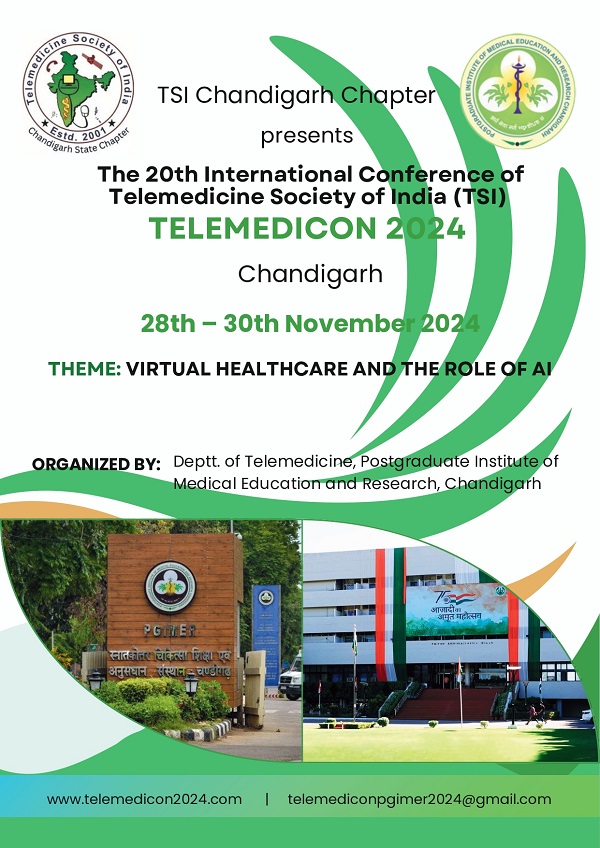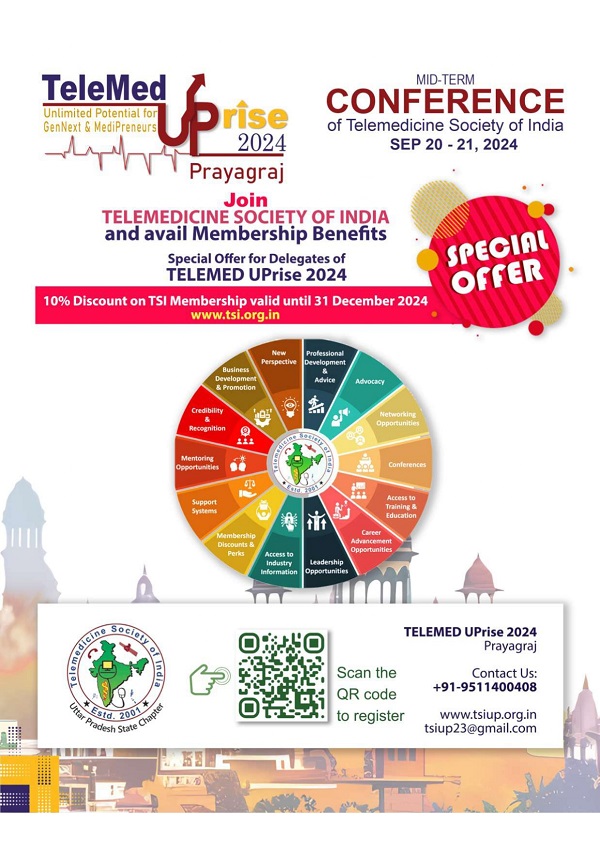Telehealth Newsletter
Official Newsletter of Telemedicine Society of India

What is New?
It has been four years since we launched this newsletter, which remains the only official regular publication dedicated to digital health emerging from India. I’ve often considered upscaling this into a journal, provided there’s sufficient interest from our esteemed members and leaders in the field. However, when it comes to publishing, it seems we Indians can be somewhat hesitant—whether due to shyness or perhaps a touch of laziness, I’m not entirely sure. Even sourcing articles for this small publication seems to be challenging.
The recent events in Kolkata have deeply shaken the medical community. The situation is distressing and has also brought to light the harsh working conditions in our government medical colleges, conditions that, unfortunately, have not changed much since I graduated in the 1980s. Please keep the young medical student and her family in your thoughts and prayers.
As we approach the festival season, there are numerous activities related to digital health on the horizon. Some of these are major events, and one could easily attend a seminar or webinar almost every week. Notably, the event in the first week of October by Dr. Rajendra Gupta in Mumbai promises to be exceptional. He has gathered prominent figures in digital health from around the globe, and it will be held at the Jio Convention Centre. Do register and enjoy this digital health feist before our November annual TELEMEDICON.
Wishing you all joyful festivities!
Thank You
Dr. Sunil Shroff
Chief Editor
Vice President, TSI
::TSI Activities from Around the Country::

Demystifying AI: Reflections from the APA 2024 Panel Event
Smriti Joshi MBPsS
M.phil Clinical Psychology
Chief Psychologist & Member board of Directors, Wysa
Participating in the “Demystifying AI” panel at the APA 2024 conference was both an honor and a significant milestone in my career. Representing the Indian clinical psychologist community on such a global stage brought together years of work exploring how digital technologies, particularly AI, can transform mental health care.
My Journey into Digital Mental Health
My journey into digital mental health began with a realization that the demand for mental health services far exceeded what traditional, in-person sessions could offer. This gap between need and availability led me to explore digital solutions that could extend the reach of mental health care.
A pivotal moment occurred in 2011 during my telemental health certification course. I came across an image that sparked a vision (see below) : using technology to make mental health care accessible to millions. I also remembered what one of my patients had said to me when she met with an accident and couldnt come in for therapy sessions “wish I could speak with you from wherever I am or could access to some support while i was on bedrest” . What began as an ambitious idea has since evolved into a reality, with digital mental health solutions becoming integral to everyday practice.

I’ve been fortunate to be part of the founding team for the world’s first, safest and most evidence-based mental health chatbot- Wysa.,What makes Wysa unique is its emphasis on doing things right—prioritizing domain expertise and ethical considerations over speed to market. Working with cross-functional teams and founders who value this approach has taught me that innovation in mental health isn’t just about technology. It’s about creating solutions that are ethical, effective, and genuinely beneficial for users.
Key Themes from the Panel Discussions
The panel discussions were filled with insights that are shaping the future of AI in mental health care. Here are some of the key themes we explored:
1. Bridging Psychology and AI:
A central theme was how our background in psychology equips us to engage with AI in meaningful ways. Our deep understanding of human behavior, cognition, and ethics positions us uniquely to contribute to AI’s development. However, with AI evolving rapidly, expanding our expertise—particularly in areas like data science and human-computer interaction—is crucial to effectively guiding AI’s integration into mental health care.
2. Enhancing Clinical Practice with AI:
AI holds significant potential to enhance clinical practice, particularly in improving decision-making and personalizing treatment. We discussed how AI can analyze large datasets to offer insights that improve clinical outcomes, such as supporting differential diagnoses and tailoring interventions to individual needs. However, we agreed that AI should complement—not replace—the human element in therapy. The therapist-client relationship remains at the heart of effective mental health care, and AI should support, not undermine, this connection.
3. Psychologists as Active Contributors to AI Development:
Another powerful message from the panel was the need for psychologists to transition from observers to active contributors in AI development. Our expertise in human behavior and ethics is critical in shaping AI tools that are innovative, safe, and ethical. Being involved from the beginning ensures that AI is developed in ways that truly benefit mental health care and adhere to ethical standards.
4. AI for Enhanced Clinical Workflow and Continuity of Care:
We discussed the transformative role AI can play in streamlining clinical workflows and ensuring continuity of care, which can lead to better outcomes for both patients and providers. By taking on routine tasks such as scheduling, follow-ups, and administrative documentation, AI frees up clinicians to focus more on patient care. AI-driven tools can also provide continuous support between sessions, helping maintain therapeutic momentum and improving overall patient outcomes. This seamless integration of AI into the clinical workflow not only enhances efficiency but also contributes to more consistent and personalized care.
5. Addressing Anxiety About AI:
AI’s growing role has naturally caused anxiety among both professionals and the public. We discussed how psychologists can play a key role in alleviating these fears by demystifying AI and helping people understand its capabilities and limitations. By fostering a more informed and balanced perspective, we can help everyone feel more comfortable with AI’s integration into daily life and mental health care.
6. Ethical Considerations and Data Privacy:
Ethics was a major focus, particularly around data privacy and the risk of bias. While AI offers tremendous benefits, it also raises challenging ethical questions. We have a responsibility to ensure that the data used to train AI is diverse, representative, and handled with the utmost care to protect clients’ privacy. These considerations are crucial to maintaining the trust that underpins the therapist-client relationship.
7. Building Evidence and Involving Stakeholders:
Successfully integrating AI into mental health care requires building a robust evidence base. This means continuously collecting and analyzing data to demonstrate the effectiveness of AI tools. Equally important is involving clinicians and service users in the development process. Their feedback ensures that AI tools are not only clinically effective but also practical and user-friendly. We discussed the value of user panels, which include diverse voices, to continually make datasets inclusive and relevant to the populations they serve.
8. Personalization and Inclusivity in AI Interventions:
Finally, we explored the potential of AI to create personalized and culturally adapted mental health interventions. AI can tailor care to the unique needs of each individual, but only if it’s developed with a focus on inclusivity. Without careful oversight, AI could unintentionally reinforce existing biases and inequalities. That’s why it’s crucial for psychologists to work closely with AI developers to ensure these tools are fair and beneficial for everyone.
Reflections on My Learnings
Reflecting on my journey, I’ve learned several critical lessons about what works and what doesn’t in the realm of digital mental health:
Ethics and Integrity: Ensuring that digital mental health tools are developed and implemented ethically is non-negotiable. This includes upholding principles like user autonomy, beneficence, and justice.
User Safety: Protecting users from harm, whether physical or psychological, is paramount. This means implementing robust safety measures, such as risk management protocols, accurate information provision, and appropriate interventions.
Data Privacy: Adhering to data privacy standards, such as GDPR and HIPAA, is essential to building trust. Users must feel confident that their data is secure and that their privacy is respected.
Provider Training: Clinicians must be adequately trained to use digital tools effectively. This includes understanding the limitations of AI, interpreting its outputs correctly, and integrating these tools into their practice safely.
Collaboration: Developers, clinicians, and researchers need to collaborate closely to ensure that digital mental health tools are safe, effective, and aligned with ethical standards.
Evidence-Based Practice: Continuously generating and integrating clinical evidence is vital for ensuring that AI tools are effective and that they contribute positively to mental health outcomes.
AI has the potential to transform clinical psychology and psychiatry by making mental health care more accessible, improving diagnoses, and enhancing patient engagement. But as clinicians, we need to guide how these technologies are integrated into our practice. By staying informed, involving all stakeholders, and ensuring that AI tools are developed and used ethically, we can provide more personalized and effective care to those who need it most.. I’m excited to keep pushing forward, continuing to innovate, and mental health support scalable and permission less.

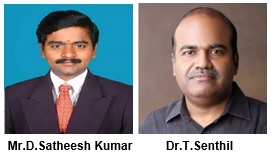
Advancing Healthcare Through Digital Health & Telemedicine
Mr.D.Satheesh Kumar
Secretary–TSI, Tamilnadu Chapter | Joint Secretary–TSI (National)
Dr. T. Senthil
Vice President, TSI-Tamil Nadu State Chapter
EC Member-TSI (National)
Conference on “Digital Health & Telemedicine” Overview
The conference on “Digital Health & Telemedicine” aimed to explore the evolving landscape of healthcare technology, focusing on the integration of digital health solutions and telemedicine practices. The primary objectives were to educate healthcare professionals on the latest trends, share innovative approaches in telemedicine, and discuss the challenges and opportunities associated with digital health. This event was particularly significant in the post-pandemic era, where telemedicine has become an essential component of healthcare delivery.
Venue and Organization
The conference was held in association with the Tamil Nadu Dr. MGR Medical University, where all government and private medical colleges and hospitals in Tamil Nadu are affiliated, except for some deemed universities. This collaboration ensured extensive outreach, particularly within the government sector. Special recognition goes to Dr. K. Selvakumar, Past President of TSI & Visiting Professor of the university, and Dr. Sunil Shroff, currently Vice President of TSI, who served as conveners. Their close ties with the university’s Vice Chancellor were instrumental in organizing the event.
The conference took place on Friday, August 2, 2024, at the Silver Jubilee Auditorium of The Tamil Nadu Dr. M.G.R. Medical University, Chennai. This was the third time the TSI Tamil Nadu Chapter collaborated with the university to host an event on its premises. Nodal officers in telemedicine from various medical colleges and district hospitals participated, both in-person and online. Directors from Medical Education, Rural Health, and Public Health departments also participated, chairing several sessions.
Inaugural Ceremony
The event commenced with the traditional Thamizh Thai Vazhthu and the lighting of the lamp (Kuthuvilakku), followed by a welcome address by Dr. P. Arumugam, Registrar (FAC) of the university. Dr. Sunil Shroff introduced the conference’s aims, while Dr. K. Narayanasamy, Vice-Chancellor of The Tamil Nadu Dr. M.G.R. Medical University, delivered the Inaugural Address, highlighting the university’s vision for digital health and telemedicine in Tamil Nadu.
Dr. Kim Ramasamy, President of TSI, was the Guest of Honour and delivered the Presidential Address. Dr. H. Ikramulla, President of TSI, Tamil Nadu Chapter, delivered the Keynote Address, emphasizing the importance of telemedicine in modern healthcare.
The event featured seven scientific sessions:
- Session I: Telemedicine Application
– Focused on the university’s vision for digital health, remote patient monitoring, and the integration of payment gateways and digital signatures in telemedicine. Esteemed speakers shared valuable insights. - Session II: Telemedicine Growth & Practice
– Covered the impact of COVID-19 on telemedicine and best practices for establishing virtual clinics, with contributions from Dr. Subramaniam Swaminathan and Dr. Sunil Shroff. - Session III: Telemedicine Setup & Remote Monitoring Devices
– Discussions centered on network connectivity, video conferencing, wearables, and other critical devices. Experts like Mr. Ashwin Desai and PadmaShri Dr. S. Natarajan offered their perspectives. - Session IV: Evaluation of Telemedicine & NMC Guidelines
– Explored the global landscape of telemedicine, its history in India, and associated legal issues. Renowned speakers Dr. K. Ganapathy, Dr. R. Kim, and Dr. Sunil Shroff provided authoritative lectures. - Session V: Telemedicine in Specialties
– Highlighted telemedicine’s application in various specialties, including Tele-Dermatology, Tele-Cardiology, and Tele-Surgery, with contributions from Dr. P. Manokar, Dr. Sanjay Sharma, and Dr. Murthy Remilla of ISRO. - Session VI: Tele-Dentistry & Revenue Models in Telemedicine
– Featured discussions on Tele-Dentistry by the Dean of Sri Ramachandra Dental College and a successful revenue model in Tele-Ophthalmology presented by Dr. T. Senthil. - Session VII: Tele-Education
– The final session explored telemedicine’s role in education, including tele-mentoring and mobile telemedicine vans, with insights from leaders like Dr. Chavan Kalidas, Dean of ESI Medical College, and Dr. Sheila John.
Outcomes
The conference successfully met its objectives, fostering a deeper understanding of digital health and telemedicine among participants. Key outcomes included:
– Increased awareness of telemedicine’s role in improving healthcare accessibility and efficiency.
– Identification of best practices for implementing telemedicine in various specialties.
– Enhanced collaboration among healthcare professionals, fostering an environment of innovation and shared learning.
Innovative Approaches
The conference showcased several innovative approaches, including:
– Telemedicine in Specialties: Sessions focused on telemedicine applications in cardiology, dermatology, and other specialties, providing practical insights into the specialized use of telehealth.
– Tele-Education: Discussions on using telemedicine for uniform teaching practices and examinations highlighted its potential to revolutionize medical education.
The event concluded with a group photo and a vote of thanks by Dr. S.T. Radhiga, Professor & Head of the Department of Medical Education & Curriculum Development at the university.
Conclusion
The one-day conference on “Digital Health & Telemedicine” was a resounding success, providing a platform for healthcare professionals to explore the future of healthcare through technology. The event not only met its objectives but also set the stage for ongoing innovation and collaboration within the field of telemedicine.
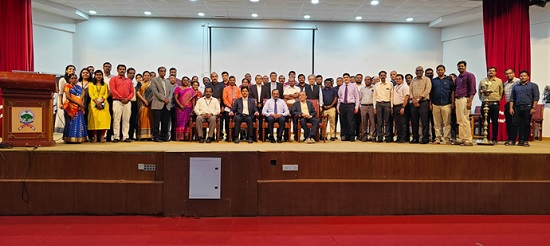
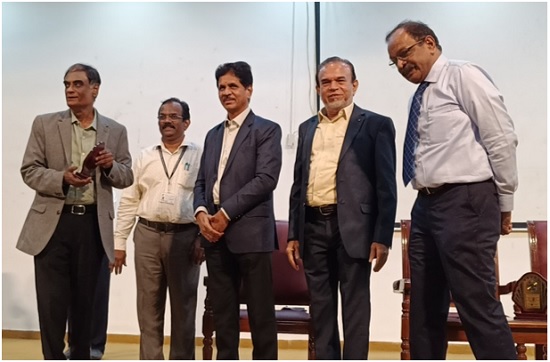

Creating Health Screening Ecosystem for Community Research
Dr. Pawan Gupta
Treasurer, TSI- NCR State Chapter | EC member- TSI Hqrs
Sr. Director (Surgical Oncology) at Max Institute of Cancer Care Delhi NCR | FOUNDER – ICanCaRe Digital Tobacco Wellness program, ICanCaRe Medical Services, ICanCaRe Academy
As part of the AAROGYAM 2024 conference, I was invited as a guest speaker to present on the topic “Creating Health Screening Ecosystem for Community Research.” The session took place on the 9th of August 2024, from 12:30 pm to 01:00 pm.
Key Points Covered:
- The importance of establishing a robust health screening ecosystem for community research.
- Strategies for integrating health screening into community settings.
- The role of healthcare professionals in advancing community health initiatives through research.
- Case studies and examples of successful community health screening programs.
Outcome:
The session was well-received by the attendees, including healthcare professionals and academic researchers. The discussion sparked interest in developing similar initiatives within their respective communities, aligning with ICanCaRe’s mission to promote health and well-being through research and education.
Follow-Up:
- Potential collaboration opportunities were discussed with attendees, which may lead to further involvement with ICanCaRe’s initiatives.
Next Steps:
- Explore potential partnerships with interested attendees to expand ICanCaRe’s outreach and impact in community health screening.
The session was an incredible opportunity to share insights on how we can build stronger health screening programs within our communities, driving impactful research and improving public health outcomes.
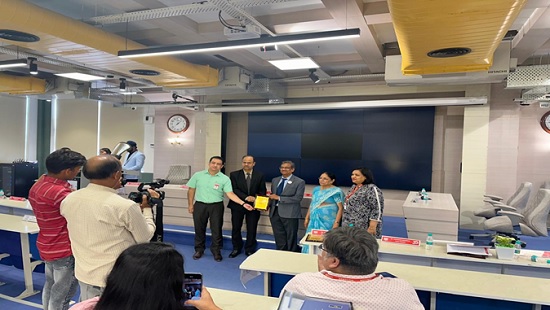
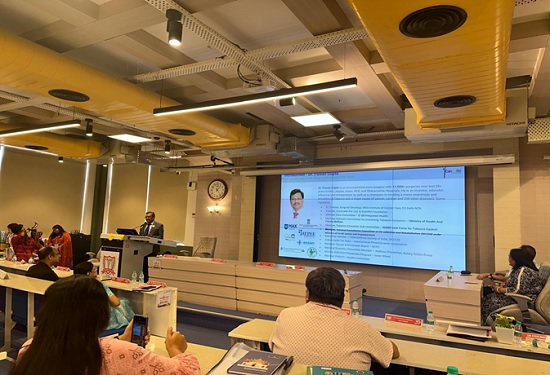

MOU between Academy of Hospital Adminstrators Noida and TSI Rajasthan Chapter
Maj. Gen. Dr. Ashok Singh,
President, TSI-Rajasthan State Chapter | Past President-TSI Hqrs
TSI (Rajasthan Chapter) has signed a MoU with Academy of Hospital Administration (AHA) on 27th July 2024.
AHA is a distinguished autonomous professional organization of highly qualified and experienced industry experts, academicians, and practitioners in the field of hospital and health systems management. The tradition of excellence extends to organizing a diverse range of academic programs, including MBA courses, PG certificate programs, Management Development Programs (MDPs), and focused training initiatives since last 37 years.
Objectives of the MoU include designing and implementing need-based academic research and short-term training courses.
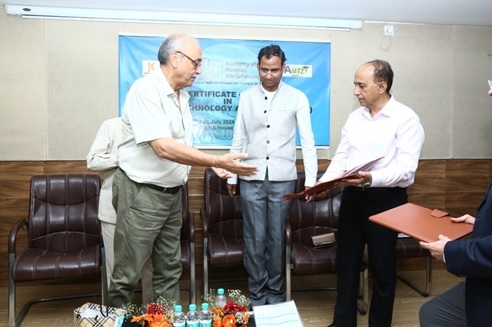
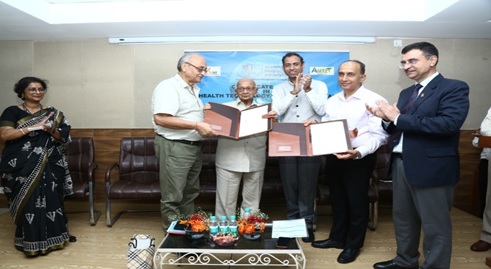
::ANNOUNCEMENTS::
To Register for the conference visit https://www.telemedicon2024.com/
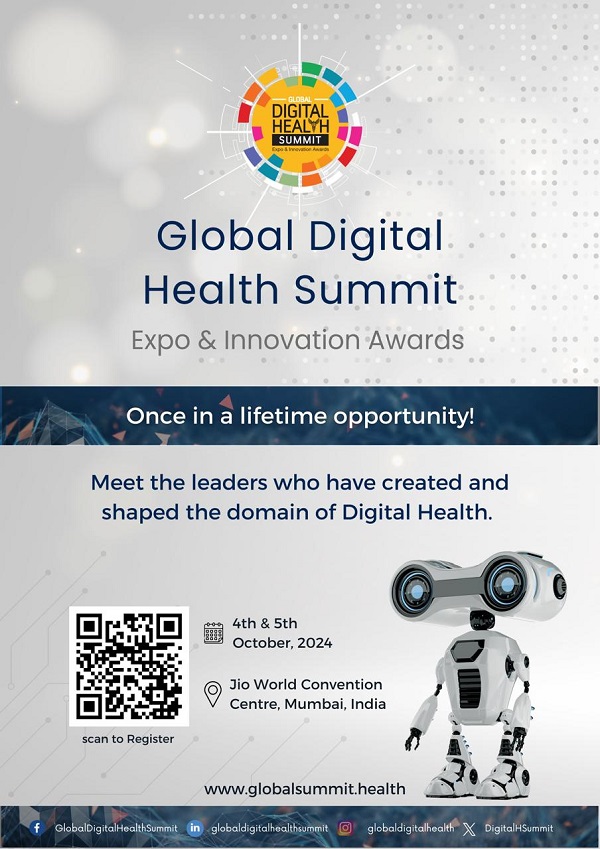
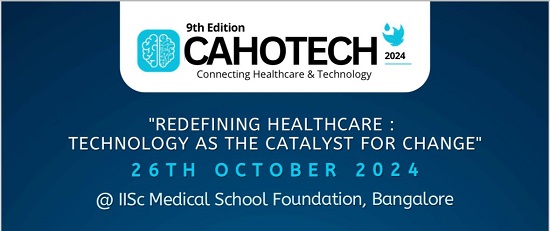
To know more about CAHOTECH 2024 visit
https://www.linkedin.com/posts/nostethbutscope_cahotech24-blr-hospinnov-pitchfest-delegate-activity-7225805311683485696-Nkg0
Telemedicine – News from India & Abroad
ChatGPT: A Time-Saving Tool for Handling Patient Queries
A study indicates that the ChatGPT chatbot may serve as an effective tool to save time by addressing patient inquiries directed to the urologist’s office……. Read More
Elon Musk’s Brain Chip Experiment Continues to Succeed
Tesla and SpaceX founder Elon Musk announced that Neuralink is on track to have hundreds of people with brain chips within a few years………. Read More
AI-Powered Body Scanner Predicts Metabolic Syndrome Risk.
Mayo Clinic researchers are using AI and a cutting-edge 3D body scanner, originally designed for fashion, to predict metabolic syndrome risk more accurately….. Read More
AI in Indian Healthcare: The Billion-Dollar Game Changer by 2025
India’s AI healthcare market is skyrocketing, with a projected value of $1.6 billion by 2025. This rapid growth, fueled by a 40.6% annual increase…….. Read More
Telemedicine Practice Guidelines – A Foundation Course for RMPs by TSI Faculty
To know more about the Telemedicine Foundation Course click on the link below:
https://tsitn.org/tpg-course/
TSI invites all the TSI Chapters and Members to submit information on their upcoming Webinar or Events (50 words), News related to Telemedicine (200 words) or short articles (500 words) for the monthly e-newsletter.Guidelines for submission to TSI Newsletter-
- Report can be from 500 to 600 words
- Report Should be relevant to Telemedicine or Medical Informatics
- No promotion of self or any product
- Avoid plagiarism
- All references should be included
- Provide any attributions
- Visuals are welcome including video links
- Send full authors name, degrees, affiliations along with a passport sized photograph of good resolution. If multiple authors only main author photo to be sent.
Submission may be sent to – tsigrouptn@gmail.com
Editors reserve the rights for accepting and publishing any submitted material.
Editor in Chief – Dr. Sunil Shroff
Editors – Dr. Senthil Tamilarasan & Dr. Sheila John
Technical Partner- https://www.medindia.net


